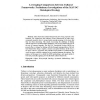Free Online Productivity Tools
i2Speak
i2Symbol
i2OCR
iTex2Img
iWeb2Print
iWeb2Shot
i2Type
iPdf2Split
iPdf2Merge
i2Bopomofo
i2Arabic
i2Style
i2Image
i2PDF
iLatex2Rtf
Sci2ools
AIED
2015
Springer
2015
Springer
Leveraging Comparisons between Cultural Frameworks: Preliminary Investigations of the MAUOC Ontological Ecology
Many theoretical cultural frameworks have been proposed in the literature. For comparisons and critiques of these frameworks to make sense, community members have to assign similar-enough meanings to the terms that they use when interacting. This entails overcoming the challenge of dealing with the imprecise and interpretable definitions conveyed in frameworks due to the use of common language. The MAUOC Ontological Ecology (MOE) approach offers a strategy for dealing with this through reinterpretation of all cultural frameworks along a singular, common conceptual baseline. In this way, a far more cohesive, consistent, and controlled representation of cultural frameworks becomes available compared to just common language descriptions. The purpose of this paper is to clarify the MOE methodology, and report initial efforts into practically applying it to the Hofstede cultural framework.
| Added | 14 Apr 2016 |
| Updated | 14 Apr 2016 |
| Type | Journal |
| Year | 2015 |
| Where | AIED |
| Authors | Phaedra Mohammed, Emmanuel Blanchard |
Comments (0)

